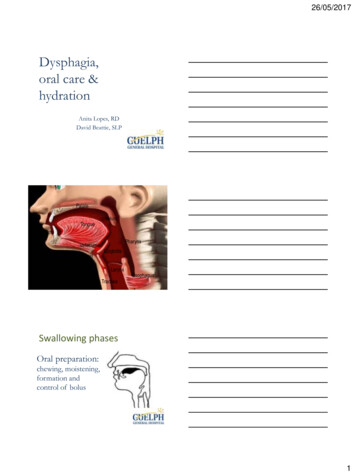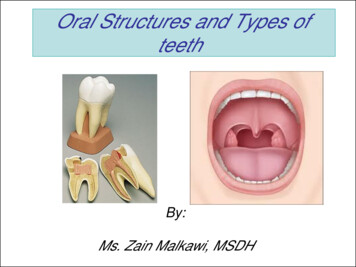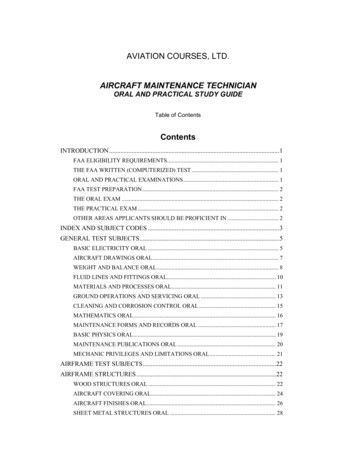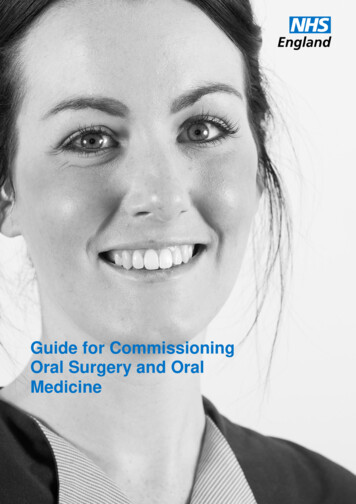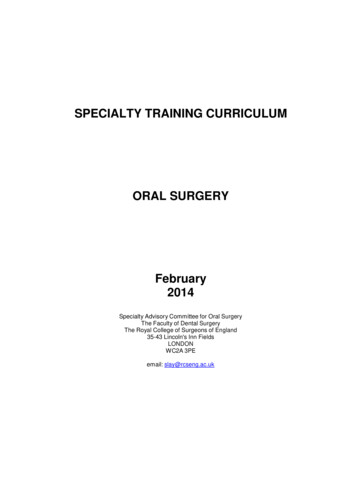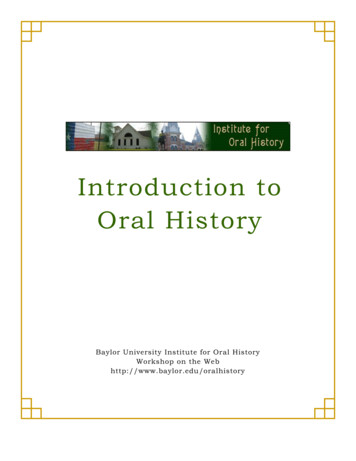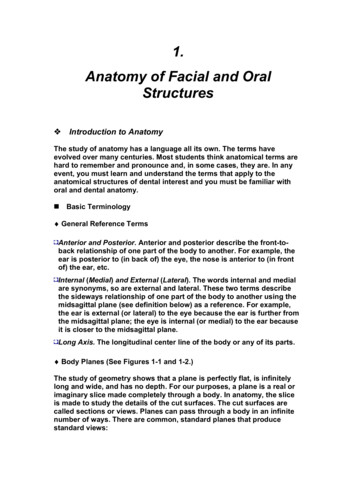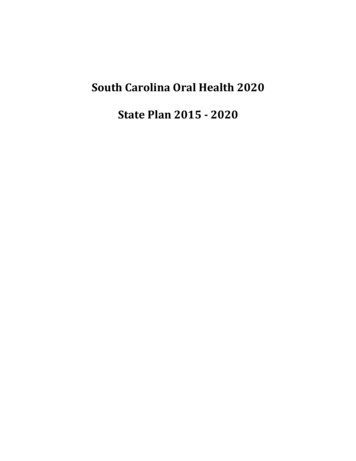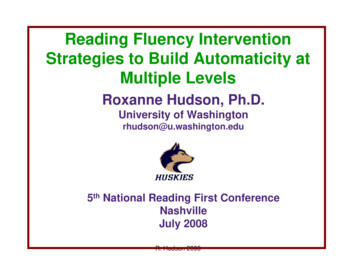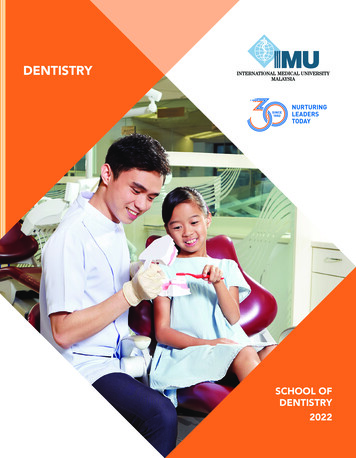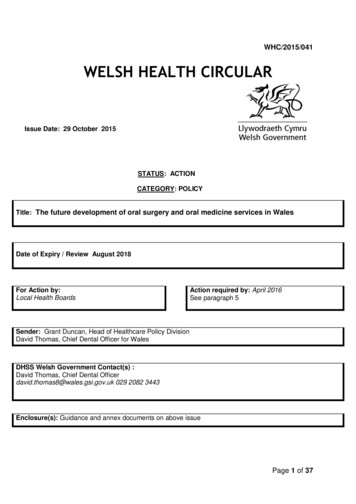
Transcription
WHC/2015/041WELSH HEALTH CIRCULARIssue Date: 29 October 2015STATUS: ACTIONCATEGORY: POLICYTitle: The future development of oral surgery and oral medicine services in WalesDate of Expiry / Review August 2018For Action by:Local Health BoardsAction required by: April 2016See paragraph 5Sender: Grant Duncan, Head of Healthcare Policy DivisionDavid Thomas, Chief Dental Officer for WalesDHSS Welsh Government Contact(s) :David Thomas, Chief Dental Officerdavid.thomas8@wales.gsi.gov.uk 029 2082 3443Enclosure(s): Guidance and annex documents on above issuePage 1 of 37
Board SecretariesABMUAneurin BevanBetsi CadwaladrCardiff & ValeCwm TafHywel DdaPowysPublic Health WalesVelindre TrustWASTSecretary to Board Secretary GroupChief ExecsABMUAneurin BevanBetsi CadwaladrCardiff & ValeCwm TafHywel DdaPowysPublic Health WalesVelindre TrustWASTChairsABMUAneurin Bevanmailto:david.jenkins6@wales.nhs.ukBetsi CadwaladrCardiff & ValeCwm TafHywel DdaPowysPublic Health WalesVelindre TrustWASTWelsh GovernmentDG/Chief Exec NHS WalesDeputy Chief Exec NHS WalesDHSS Operations TeamDHSS Comms TeamRelevant DirectorsAdditional recipientsHealth Board Directors with lead role for Primary CareHealth Board Primary Dental Care LeadsWelsh Dental Committee ChairConsultants in Dental Public Health (Public Health Wales)Chairs of Local Dental CommitteesPage 2 of 37
Consultants in Oral SurgeryDean: Cardiff Dental SchoolPostgraduate Dental Director: Wales DeaneryClinical Directors Community Dental ServicesPage 3 of 37
SummaryThe purpose of this Circular is to provide detail of Welsh Government policy todeliver a more integrated and effective oral surgery service in order to improveaccess to specialist dental services across Wales.ActionHealth boards to work in collaboration to deliver a programme of effective oralsurgery service delivery across Wales. All primary dental care practitioners will playan integral role with specialist staff working in both primary and secondary caresettings on the delivery, strengthening existing good practice and introducing newprocedures where appropriate.1. BackgroundTogether for Health – A National Oral Health Plan for Wales (NOHP) highlights theneed to meet the four dental related actions included in the Welsh Government’sProgramme for Government. The NOHP requires health boards to develop localaction plans, to meet identified oral health needs, and, identify three clear themes:prevention of oral disease; service delivery; and quality and safety.In July 2015 Welsh Government produced the second Annual Report whichidentified a requirement for continued work with health boards to ensure all theiractions are progressed, monitored and delivered. Common themes and key prioritiesof health board plans included issues associated with an increasing and ageingpopulation, and a lack of access to more specialised services, in particular access toOral Surgery. With the launch of the national plan for primary care in Wales, 2014-15is the start of an ongoing focus into enhanced delivery of services in a primary caresetting.2. Key Issues A significant proportion of current referrals made to Oral Surgery/Oral &Maxillofacial Surgery (OMFS) specialists include dento-alveolar surgery and thisless complex work has caused increasing pressure on hospital consultant servicewaiting lists since the dental contract reforms in 2006. Recent reports in England and Wales recommended that much of the minor oralsurgery care could be delivered by specialists working in primary care. Some health boards have already established local primary care based oralsurgery services using dentists with enhanced skills and experience in oralsurgery. The All Wales Oral Surgery working group adapted work carried out by theDepartment of Health on defining procedures and modifying patient factors thatdescribe the complexity of a case.Page 4 of 37
Local Oral Surgery and Oral Medicine service delivery is often based on historicalmodels. Health boards and clinicians working together with patients can begin toimplement new models of service as they emerge. It is important the service(including the workforce) is evaluated to ensure it is appropriate for the needs ofthe population. The attached guidance contains a model pathway approach to Oral Surgery. This pathway ensures that primary care dental teams and medical colleaguesunderstand how to navigate a patient via a referral management system. Thissystem can comprise of robust, consultant-led triage, take into account local skillmix, and efficiently direct those patients with more complex Oral Surgery needsto the most appropriate provider and location3. Needs AssessmentOral health needs assessments for Oral Surgery and Oral Medicine, are currentlypoorly described. There are guidelines that define some elements of Oral Surgeryneed, e.g. NICE guidelines relating to the removal of third molars. However, for themajority of Oral Surgery procedures and Oral Medicine conditions, no specific needsassessments or guidelines exist. Therefore, health boards working with consultantsin dental public health need to rely on proxy measure and service activity data.Sources of information that can assist in assessing the dental needs of the localpopulation are available through PHW observatory data and Welsh Oral HealthInformation Unit (WOHIU) and data from Adult and Child Dental Health ealth boards should ascertain the composition of the workforce delivering OralSurgery and Oral Medicine services locally i.e. the numbers of General DentalPractitioners, dentists with enhanced skills and experience, Oral Surgery specialists,Oral Surgery consultants, OMFS surgery consultants, Oral Medicine consultants,SAS grades and Oral Surgery/Oral Medicine/OMFS trainees. In respect of patientstreated, health boards obtain detailed FP17W data of the numbers of Band 2 andBand 3 courses of treatment that include dental extractions; and those that are fortreatment on referral and of those, the number that included provision of sedation. Inaddition Hospital Episodes Statistics (HES) data can provide an overview of the careprovided in secondary care and the potential for patients with less complex oralsurgery needs to be treated in primary care.4. FundingNo additional central funding allocation is available. It is expected that health boardscan use current allocations for both primary and secondary dental care efficientlyand effectively to achieve service change.Page 5 of 37
5. Programme developmentHealth boards should use this guide to review progress in implementing redesignedpathways to benefit patients. The first task will be to establish locally based ManagedClinical Networks1 (MCNs) and then complete a needs assessment. This will involveworking with PHW Consultants in Dental Public Health, clinicians and otherstakeholders including patient groups. The introduction of a referral managementsystem to engage clinicians should underpin this. This guidance contains directionand detail to support implementation of best practice.It is acknowledged health boards are at different stages in developing specialistdental services and progress in introducing these services will therefore differ acrossWales. It would be particularly challenging to expect all health boards to implementthe programme immediately; however it is reasonable to expect an action plan to bedelivered by April 2016.6. Monitoring and EvaluationWelsh Government Healthcare Policy team will monitor delivery through: discussion at annual review meetings with health boards;formal assessment of Local Oral Health Plan (LOHP) delivery;annual reports from relevant MCNs; anddeveloping a Strategic Advisory Forum in Oral Surgery/Oral Medicine - the aimsand objectives of which will be based on the current Strategic Fora inOrthodontics and SCD.Evidence of the local consultation process will be required together with details of theaction taken to engage local stakeholders and to deliver the required developmentsin service provision. A series of performance measures have been developed inorder to monitor progress effectively (Annex 4 of the enclosed guidance).1MCNs should be based on the geographical areas covered by MCNs supporting other speciality areas (SpecialCare Dentistry and Orthodontics) in Wales. MCN objectives will include overseeing the implementation and thefunctioning of the specialist pathway, accrediting dentists with enhanced skills, quality improvement, mentorship,education, audit and leadership. The chair should be accountable to each constituent health board. It will beconsultant-led where possible and all Level 2 and 3 Oral Surgery/Oral Medicine providers along with health boardmanagerial colleagues will play an active role and will have a formal link to the MCN.Page 6 of 37
Guidance on the future development of oralsurgery and oral medicine services in WalesPage 7 of 37
1. IntroductionThis document is intended as a guide for the development of specialist Oral Surgeryand Oral Medicine services in Wales. It provides an outline description of theservices, including a summarised illustrative patient journey to enable thedevelopment of standardised Oral Surgery and Oral Medicine clinical pathways.Service transformation is considered including the implications of service redesignon the workforce. A minimum standard specification for the procurement of specialistOral Surgery and Oral Medicine services is presented. Measures that assess clinicaloutcomes, patient safety and patient-reported outcomes (experience) are describedwhich enable quality and effectiveness of services to be assessed and reviewed.This guidance builds on a report entitled ‘Future implementation of oral surgeryservices in Wales’ which was presented to the Welsh Dental Committee by the OralSurgery working group to inform the advice given to the Minister for Health andSocial Services. In addition it has drawn heavily on similar Commissioning guidancerecently published by NHS England.This guidance is about supporting health boards and primary care clusters to worktogether with clinicians to ensure that resources invested by the NHS in Oral Surgeryare used in the most effective way to provide the best possible quality and quantity tomeet patient’s needsThis Oral Surgery and Oral Medicine guidance has been published to: transformservices at a local level; to meet local needs and circumstances; and achieve bestvalue and sustainability for the resources available.Page 8 of 37
2. Speciality and service descriptions2.1Oral Surgery and Oral MedicineThe specialty of Oral Surgery deals with The diagnosis and management of pathology of the mouth and jaws thatrequires surgical intervention. Oral Surgery involves the treatment of people of all ages, the management of dentally anxious and medically complex patients. provision of care by both Oral Surgeons and Oral & Maxillofacial Surgeons asthe clinical competencies of these two specialties overlap.The UK General Medical Council recognises ‘Oral & Maxillofacial Surgery’ as amedical specialty. Maxillofacial surgery is usually taken to mean more complexprocedures including treatment of major trauma, head and neck malignancies andcongenital facial deformity. The UK General Dental Council includes a specialistregister for Oral Surgery / Oral Medicine.In general the term “oral surgeon” applies to a clinician who is qualified in dentistrywhile “oral and maxillo facial surgeon” is more usually applied to a clinician who isqualified in both dentistry and medicine.Oral Medicine involves diagnosis and non-surgical oral health care management ofpatients with chronic, recurrent and medically related disorders of the mouth andassociated structures.2.2Historical and current service provisionPrimary care based General Dental Practitioners (GDPs) are expected to undertakeroutine oral surgery care, such as dental extractions, as part of their general dentalservices contracts. More complex oral surgery care is provided by specialists in OralSurgery and by Oral Surgery and Oral & Maxillofacial Surgery (OMFS) consultants(including academics) who may work in primary care or secondary care settings.Secondary care based Oral Surgery consultants would not normally be found instand-alone units; rather they would be integrated with OMFS units with theopportunity for skill-mix and multi-disciplinary team working. Postgraduate dentists intraining working under consultants may also provide oral surgery care.Access to academic units offering Oral Surgery and Oral Medicine services is onlyavailable in the University Hospital of Wales, Cardiff. Typically, OMFS units in DistrictGeneral Hospitals also provide some of these services.A significant proportion of referrals made to Oral Surgery/OMFS specialists includedento-alveolar surgery and this less complex work has caused increasing pressureon hospital consultant service waiting lists since the dental contract reforms in 2006.Recent reports in England and Wales recommended that much of the minor oralsurgery care could be delivered by specialists working in primary care. Some healthboards have already established local primary care based oral surgery services.Some dentists, (who are not necessarily on the GDC specialist list for Oral Surgery)have enhanced skills and experience in oral surgery. They are referred to asPage 9 of 37
Dentists with Enhanced Skills (previously called, ‘Dentists with a Special Interest’(DwSI)).The development of high quality patient centred care using prudent healthcareprinciples means that it is not appropriate to provide treatment in secondary careservices which can safely and effectively be provided in primary care settings.Evidence from Audits of referrals in Wales and across the UK indicate that asignificant percentage of patients treated in Oral and Maxillofacial departments couldhave received care outside the hospital department often more locally and probablyin a more cost effective manner by an appropriately trained clinician.In planning Oral Surgery services, health boards should be mindful thatreconfiguration could jeopardise the sustainability of Oral and Maxillofacialdepartments where this service is still required, or that at least the configuration ofthese services should also be considered if more effective primary care basedservices are developed.2.3Training issuesThe General Dental Council (GDC) describes the learning outcomes that dentalprofessionals need to demonstrate by the end of their training to facilitate registrationand approves the specialist training curricula for each of the thirteen dentalspecialties.A detailed description of training issues for each speciality is contained in Annex 1.3. Clinical Services3.1Complexity levels and proceduresThe All Wales Oral Surgery working group adapted work carried out by theDepartment of Health Advanced Care Pathway Working Group on definedprocedures and modifying patient factors that describe the complexity of a case.The provision of Oral Surgery is on the basis of the competency of the practitionerproviding the service rather than the setting of its provision, although there isobviously a relationship between the two. As noted previously the most cost effectivecare is often provided outside hospital settings by practitioners with the correct levelof competence for the treatment required. However this model may not beappropriate under all circumstances and it is necessary to establish levels of trainingand experience that meet patient treatment needs. It is suggested that three levelsshould be recognised where demand is appropriate to this model.Level 1 – Procedure/conditions to be performed or managed by a dentistcommensurate with a level of competence as defined by the Curriculum for DentalFoundation Training or its equivalent.Level 2 – Procedures/conditions to be performed or managed by a dentist withevidence of additional competencies above those commensurate with level ofcompetence as defined by the Curriculum for Dental Foundation Training or itsPage 10 of 37
equivalent but below the level of a professional recognised as a specialist at theGDC defined criteria (a Dentist with Enhanced Skills - DES).Level 3a – Procedures/conditions to be performed or managed by a clinicianrecognised as a specialist at the GDC defined criteria and on a specialist list; or by aconsultant.Level 3b – Procedures/conditions to be performed or managed by a clinicianrecognised as a consultant in the relevant specialty, who has received additionaltraining which enables them to deliver more complex care, lead MDTs, MCNs anddeliver specialist training. The consultant team may include trainees and SASgrades. Where OMS consultants are not registered with the GDC they will not beeligible for performers list. Some OMFS consultants will be included in both the GMCand GDC specialist list; others will only be included in GMC specialist register.Level 1 and 2 procedures would usually be performed in primary care setting.However, some Level 1, 2 and 3 procedures may be performed in a secondary caresetting if modifying patient factors or local circumstances require this e.g.requirement for skill mix and/or multidisciplinary team and/or general anaesthetic.Annex 2 contains a detailed description of each level of competency and procedurealong with any associated modifying factor.Page 11 of 37
Reproduced from NHS England Commissioning GuidePage 12 of 37
Reproduced from NHS England Commissioning GuidePage 13 of 37
4. Service Re-design and future development of Oral Surgery and OralMedicine in Wales4.1Current models and challengesLocal Oral Surgery and Oral Medicine service delivery is often based onhistorical models. Health boards and clinicians working together with patientscan begin to implement new models of service as they emerge. This willpromote innovation; allow testing and validating of best practice, and sharingof expertise to get the best ‘local fit’. It will help to overcome local vestedinterests and ensure services are delivered in the best interests of patientsand the population. Once a pathway approach to Oral Surgery care isestablished it is important that the service (including the workforce) isevaluated to ensure it is appropriate for the needs of the population.Introduction of a referral management service with consultant-led triage willprovide more accurate data with respect to population need.4.2Oral Surgery service redesignTogether for Health: A National Oral Health Plan for Wales 2013-2018 waspublished in March 2013 and highlighted the need for health boards todevelop additional access to community based dental specialist services. Italigns to the purpose of this Oral Surgery and Oral Medicine guidance. OralSurgery and Oral Medicine services need to be integrated and deliveredaround the needs of patients rather than organisations or trainingprogrammes. This is particularly relevant for Oral Surgery where emergingcare pathways can support and strengthen primary and ‘out of hospital care’.Clinicians need to understand that there is a clinical cost to working in an outdated way. One abandoned or failed treatment is potentially another patient’sdelay or lack of treatment that could have improved oral health. This guide isabout supporting health boards and primary care clusters to work togetherwith clinicians to ensure that resources invested by the NHS in Oral Surgeryare used in the most effective way to provide the best possible quality andquantity of care for patients to meet need. Consultants and specialists in OralSurgery and Oral Medicine can assist in leading change and provide a moreeffective use of resources by broadening their influence with primary careclinicians. Consultants and specialists should consider whether some of theirspecialist time and knowledge would be better spent supporting primary care,and thereby benefit many more patients than they can treat working in anacute setting.The focus is therefore to develop an oral surgery pathway to support a single,consistent, integrated model of service delivery. This guide recognises that‘one size does not fit all’ and is intended to stimulate debate and actionlocally. However transformational and transactional change is required in thedelivery of Oral Surgery and Oral Medicine specialist services, and healthboards (supported by Public Health Wales) are encouraged to:Page 14 of 37
review local patient need and current service provision,Assess progress using the illustrated patient journey within this guideas a benchmark to set pace and direction locally.An assessment of how much progress the redesign of a local servicehas made should be the first step and a priority for health boards.4.3 Oral Medicine service redesignAt the present time, Oral Medicine does not have specialist primary carepractitioners and so a transitional phase would be required whilst theworkforce was developed. A consultant-led Managed Clinical Network (MCN)based on a “Hub and Spoke” model could provide significant benefits in termsof continuity, ease of transfer between settings, education, research andtraining and an enhanced patient journey with improved outcomes. In thismodel the health boards could utilise the existing clinical resource supportedby greater team-working and be assisted by the appointment of an OralMedicine consultant lead clinician and local lead clinicians within eachsecondary care setting (may be from another dental specialty or OMFS).4.4Development of Managed Clinical NetworksLocal MCNs need to be established. The networks will be based on thegeographical areas covered by MCNs supporting other speciality areas(Special Care Dentistry and Orthodontics) in Wales. MCN objectives willinclude overseeing the implementation and the functioning of the specialistpathway, accrediting dentists with enhanced skills, quality improvement,mentorship, education, audit and leadership. The chair should be accountableto each constituent health board. It will be clinician-led where possible and allLevel 2 and 3 Oral Surgery/Oral Medicine providers along with health boardmanagerial colleagues will be invited to play an active role and will have aformal link to the MCN.In addition Welsh Government will develop a Strategic Advisory Forumin Oral Surgery/Oral Medicine - the aims and objectives will be based onthe current Strategic fora in Orthodontics and SCD.Health boards and clinicians must work together with MCNs and in doing socan begin to influence service planning and design to promote innovation,implement best practice, and share expertise to get the best ‘local fit’ at apace that reflects local circumstances.Where Level 2 care can be delivered in a non-hospital setting (unless it isrequired for training purposes) a consultant-led MCN can work to ensureconsistent quality of care.Page 15 of 37
4.5How an ‘ideal’ Oral Surgery Service model might lookOral Surgery services will be delivered using guidance developed from aconsultant-led MCN. Health boards and MCNs would ensure the correct levelof competence and that quality and outcome were being achieved for patientsregardless of setting. Primary care clinicians would competently deliver Level1 case complexity. Supervised undergraduate clinicians would deliver anagreed proportion of Level 1 cases as part of their training. Additional trainingmay be required for those clinicians lacking core clinical skills (either selfreferred or identified through the referral management system to enable themto deliver Level 1 care. Health Boards will need to identify these individualsand liaise with local consultant units/Wales deanery to facilitate thedevelopment of competency.The Oral Surgery pathway would ensure that primary care dental teams andmedical colleagues understand how to navigate a patient to a referralmanagement system. This system would comprise robust, consultant-ledtriage, take into account local skill mix, and efficiently direct those patientswith more complex Oral Surgery needs to the most appropriate provider andlocation. Urgent/suspicious lesions would be appropriately referred forassessment and treatment in accordance with the 2-week cancer pathway.Oral Surgery specialists would be responsible for the timely delivery of themajority of Level 2 Oral Surgery services in primary care (with sedation ifneed is identified). There would be MCN assessment/assurance of clinicians’competency to deliver care effectively. Services would be provided usingdetailed service specifications, and underpinned by the same standards assecondary care oral surgery units.Level 3 services would be delivered, depending upon local availability, byconsultant-led oral surgery teams within twenty six weeks of patient referral.This would enable OMFS units to deliver more complex care. Where there areno local consultant Oral Surgery teams, OMFS units will provide Level 3 care.Undergraduate/postgraduate trainees in acute or dental hospital consultantled settings would deliver a locally agreed proportion of Level 2 and Level 3Oral Surgery services.Appropriate use of Patient Reported Experience Measures (PREMs) andPatient Reported Outcome Measures (PROMs) and quality indicators wouldprovide data with respect to the quality of service provision, clinicaleffectiveness and patient experience. These data could be used forbenchmarking and annual review of services. Careful consideration of localneeds would be required when making new appointments following theretirement of OMFS and Oral Surgery consultants. Local Oral Surgery needwould also need to be considered with respect to other Oral Surgery andOMFS staffing levels.Page 16 of 37
5. Procuring new Oral Surgery and Oral Medicine Services5.1Understanding need and current service provision5.1.1 Dental NeedOral health needs assessments for complex interventions, including OralSurgery and Oral Medicine, are currently poorly described. There areguidelines that define some elements of Oral Surgery need, e.g. NICEguidelines relating to the removal of third molars. However, for the majority ofOral Surgery procedures and Oral Medicine conditions no specific needsassessments or guidelines exist. Therefore, health boards working withconsultants in dental public health need to rely on proxy measure and serviceactivity data. Health boards are advised to be familiar with the sources ofinformation available that can assist them in assessing the dental needs of thelocal population e.g. population number; residency; age; population growth;ethnicity; deprivation; lifestyle; and prevalence of oral diseases andconditions- much of this is available through PHW observatory data andWelsh Oral Health Information Unit (WOHIU) and data from Adult and ChildDental Health .1.2 Workforce issuesHealth boards through MCNs should ascertain the composition of theworkforce delivering Oral Surgery and Oral Medicine services locally i.e. thenumbers of GDPs, dentists with enhanced skills and experience, Oral Surgeryspecialists, Oral Surgery consultants, OMFS surgery consultants, OralMedicine consultants, SAS grades and Oral Surgery/Oral Medicine/OMFStrainees.5.1.3 Service provision dataHealth boards can use their access to e-reporting which can be used toobtain detailed FP17W data of the numbers of Band 2 and Band 3 courses oftreatment that include dental extractions; and those that are for treatment onreferral and of those, the number that included provision of sedation. Inaddition Hospital Episodes Statistics (HES) data can provide an overview ofthe care provided in secondary care and the potential for patients with lesscomplex oral surgery needs to be treated in primary care.5.1.4 Impact on existing servicesIn planning Oral Surgery services, health boards should be mindful thatreconfiguration could jeopardise the sustainability of Oral and Maxillofacialdepartments where this service is still required, or that at least theconfiguration of these services should also be considered if services thatcould produce more effective and cost effective oral surgery services for thepopulation of Wales were developed.Page 17 of 37
5.2Minimum standard specificationThe same quality standards of care are expected in primary and secondarycare Oral Surgery and Oral Medicine services. NHS procurement advicerecognises the weighting of quality against cost. Where service redesignreleases funds any savings should be invested into enhancing provision ofhigh quality Oral Surgery and Oral Medicine services elsewhere in the healthboard.Annex 3 contains details of the minimum service specification required.5.3Quality and outcome measuresQuality and outcome measures used in Oral Surgery and Oral Medicine willbe used by a variety of groups including: Patients/Patients’ carers/familiesProfessionals/Health boardsSpecialty-specific measures need to be patient-centred, clear and meaningfulwith regard to these different audiences using the data; for example it shouldbe possible for non-clinical audiences to understand clinical outcomemeasures.Annex 4 contains detailed guidance on quality and outcome measures6.Issues relating to the development of contracts6.1 Regulation The NHS (Personal Dental Services Agreements)(Wales) Regulations2006 (as amended)The NHS (General Dental Services Contracts)(Wales) Regulations 2006(as amended)NHS Standard ContractNHS PDS Agreements and GDS Contracts enable contracting foradvanced mandatory primary care services that could include oral surgery.PDS contracts can specify the length of contract and can be used wherethe full range of mandatory services are not being provided. The NHSStandard Contract is mandated by NHS Wales for use by commissionersfor all contracts for
routine oral surgery care, such as dental extractions, as part of their general dental services contracts. More complex oral surgery care is provided by specialists in Oral Surgery and by Oral Surgery and Oral & Maxillofacial Surgery (OMFS) consultants (including academics)

